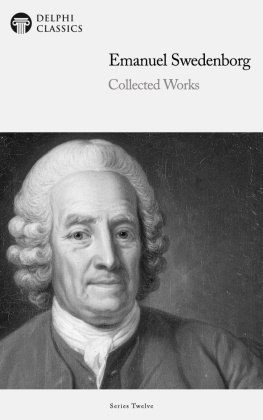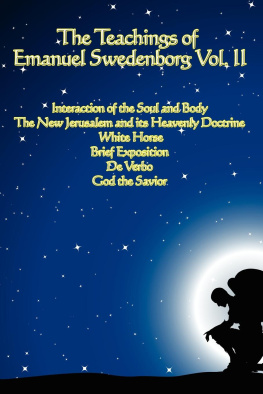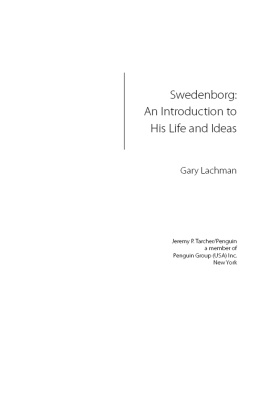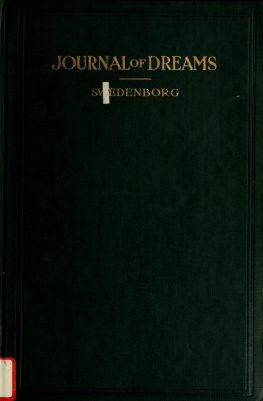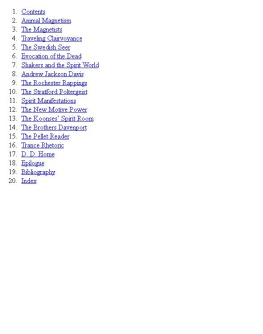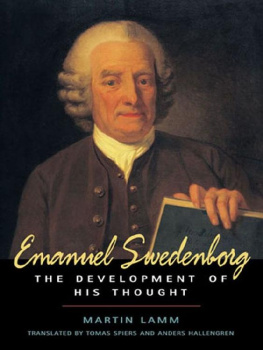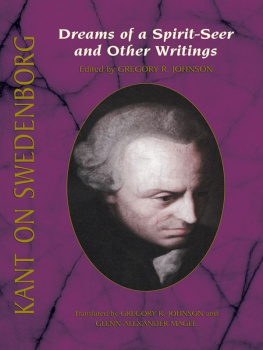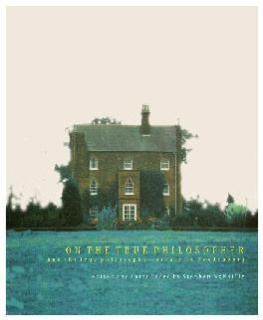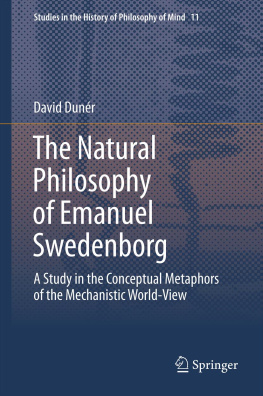
The Collected Works of
EMANUEL SWEDENBORG
(1688-1772)

Contents

Delphi Classics 2021
Version 1


Browse our Main Series

Browse ou r Ancient Classics

Browse our Poets

Brow se our Art eBooks

Browse our Classical M usic series

The Collected Works of
EMANUEL SWEDENBORG

By Delphi Classics, 2021
COPYRIGHT
Collected Works of Emanuel Swedenborg

First published in the United Kingdom in 2021 by Delphi Classics.
Delphi Classics, 2021.
All rights reserved. No part of this publication may be reproduced, stored in a retrieval system, or transmitted, in any form or by any means, without the prior permission in writing of the publisher, nor be otherwise circulated in any form other than that in which it is published.
ISBN: 978 1 80170 027 6
Delphi Classics
is an imprint of
Delphi Publishing Ltd
Hastings, East Sussex
United Kingdom
Contact: sales@delphiclassics.com

www.delphiclassics.com

Explore Philosophy at Delphi Classics

The Books

Engraving of Stockholm from Suecia Antiqua et Hodierna by Erik Dahlbergh and Willem Swidde, 1693 Swedenborg was born in Stockholm in 1688.

Panorama of Stockholm, as seen from a hot air balloon, c. 1868

Bishop Jesper Swedberg, the father of Emanuel Swedenborg; engraving from 1700
Arcana Clestia (1749-1756)

Translated by John Faulkner Potts, 1910
In June 1747, Swedenborg resigned his post as assessor of the Swedish Board of Mines (Bergskollegium) in Stockholm. He explained that he was obliged to complete a work that he had begun and requested to receive half his salary as a pension. He then immersed himself in the study of Hebrew and began work on a spiritual interpretation of the Bible, with the goal of interpreting the meaning of every verse. For over ten years he devoted his energy to the task, which would become his magnum opus and the basis of all his further theological works.
The Arcana Clestia (Heavenly Mysteries or Secrets of Heaven), Swedenborgs first and largest work, was written in Neo-Latin and published in eight volumes, one volume per year, from 1749 until 1756. It is an exposition of the spiritual sense of the books of Genesis and Exodus , according to the doctrine of correspondence (theology), supported by numerous quotations from the Hebrew Bible and the New Testament. Although Swedenborg does not deny the historicity of the stories of the Patriarchs (Bible) and The Exodus from Egypt, he explains them as describing symbolically the process of spiritual growth and struggles in each individual person. Arcana Clestia is structured as a verse-by-verse exposition of the Biblical text, showing the correspondences (connections through symbols between the material and spiritual world) in which, according to Swedenborg, the Bible is written. Each chapter features embedded sections describing the authors own spiritual experiences and expounding on his own theological views.

The first editions title page
CONTENTS
THE BOOK OF GENESIS

( 1) F ROM THE mere letter of the Word of the Old Testament no one would ever discern the fact that this part of the Word contains deep secrets of heaven, and that everything within it both in general and in particular bears reference to the Lord, to His heaven, to the church, to religious belief, and to all things connected therewith; for from the letter or sense of the letter all that anyone can see is that-to speak generally-everything therein has reference merely to the external rites and ordinances of the Jewish Church. Yet the truth is that everywhere in that Word there are internal things which never appear at all in the external things except a very few which the Lord revealed and explained to the Apostles; such as that the sacrifices signify the Lord; that the land of Canaan and Jerusalem signify heaven-on which account they are called the Heavenly Canaan and Jerusalem-and that Paradise has a similar signification.
( 2) The Christian world however is as yet profoundly unaware of the fact that all things in the Word both in general and in particular, nay, the very smallest particulars down to the most minute iota, signify and enfold within them spiritual and heavenly things, and therefore the Old Testament is but little cared for. Yet that the Word is really of this character might be known from the single consideration that being the Lords and from the Lord it must of necessity contain within it such things as belong to heaven, to the church, and to religious belief, and that unless it did so it could not be called the Lords Word, nor could it be said to have any life in it. For whence comes its life except from those things that belong to life, that is to say, except from the fact that everything in it both in general and in particular bears reference to the Lord, who is the very Life itself; so that anything which does not inwardly regard Him is not alive; and it may be truly said that any expression in the Word that does not enfold Him within it, that is, which does not in its own way bear reference to Him, is not Divine.
Next page
